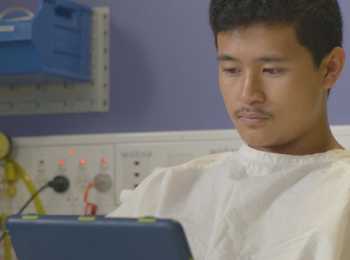Getting the right information
Not knowing what’s going on can be stressful. Ask your medical team as many questions as you like about anything you are curious or worried about.
You have a right to know what is happening to your body. Having the correct information is an important way to help you deal with your cancer. It might also help to give you a sense of control when everything else seems out of control.
You may not want all the information at the very beginning or not all at once. But as time goes on you may be ready to ask more questions.
Some people like to know every little detail, while others only want to know things in a more general way. Whatever you choose is okay.
If you don’t feel comfortable asking some questions in front of your parent, partner or support person, you can speak with your medical team privately. Young people over 16 may be allowed to make participate in decisions about their treatment.
Obviously, these decisions are serious and you need to think about them very carefully. Having the right information will help you to make decisions that are right for you.
The mental toll of chemotherapy is equal to, if not more, than the physical toll. The emotional rollercoaster you get on when diagnosed with cancer isn’t talked about a lot. This ride doesn’t stop when treatment begins. I suggest trying to prepare mentally for treatment and talking to your doctors and family about any concerns you have. Never be afraid to ask questions. Fiona, 22
What to ask
There are many questions you may want to ask your medical team throughout your cancer journey. Below are just a few suggestions to get started – these are from Canteen's list of questions to ask your treatment team. Find out more at canteen.org.au/youngpatients.
- What kind of cancer do I have?
- Where is the cancer at the moment? Has it spread to other parts of my body?
- How common is my cancer?
- What will I experience when having the tests?
- Are the tests performed here?
- What is this cancer going to mean for me?
- What are the pros and cons of each treatment option?
- Can my parents/caregiver/partner stay in hospital with me?
- What problems should I look out for and who do I contact if they occur?
- How much will treatment cost?
- Are there guidelines on how to treat my cancer?
Argh! Information overload!
When you are feeling stressed, upset or scared, it can be hard to take in and understand all of the new information you are being told, especially at the beginning.
You will have heaps of appointments with different doctors. They will probably use a lot of medical terms that might at first sound like a foreign language (but you might be surprised by how much you know later on).
Here are some other tips on how to get the right information and ways to remember it.
- Write down your questions before appointments (and also any questions your family or partner might have).
- Write the answers during the appointment or have someone with who can do this. If there are COVID-19 (or other) restrictions and you can’t take anyone with you to the appointment, your support person could be on the phone or on video call. You can ask to record the session.
- Ask people to repeat things if you don’t get it the first time (or the second time or the hundredth time); or send a follow-up email with your questions.
- Ask the doctor or the nurse to draw a picture or use an image to show you what they mean.
- Ask if there are any reliable sources of info you can read afterwards.
Remember, there are many opportunities to ask questions – if not today, add it to the list for the next time you see your treatment team, or send an email.
Dr Google
Without stating the obvious, the internet is a great source of information but, as we all know, it is also full of some pretty weird stuff. That’s not always helpful when you are trying to get accurate and useful information.
Information found on the web can be a good way to start a conversation with others, including your medical team. It may prompt new questions and help you get a better understanding.
Here are a few tips for internet searching.
Always check the source of the information
Lots of information online can be misleading or out of date. Look at where the information is coming from. Can you find contact information for the people behind the website? What is the purpose of the website – information or advertising?
There are many reliable cancer organisations that have great information that is accurate and up to date, such as Cancer Council and Cancer Australia.
Don’t believe it all
If the claims in an article seem too good to be true, they probably are. It’s a good idea to check out claims made on the internet with your parents, your doctors and nurses or a trusted web source. Most doctors are happy for you to ask their opinion about information you find on the internet.


















